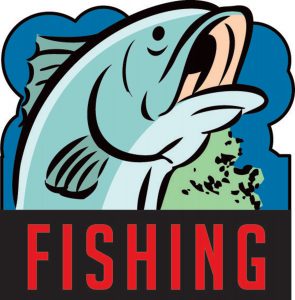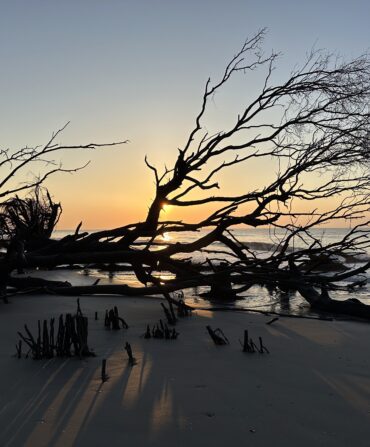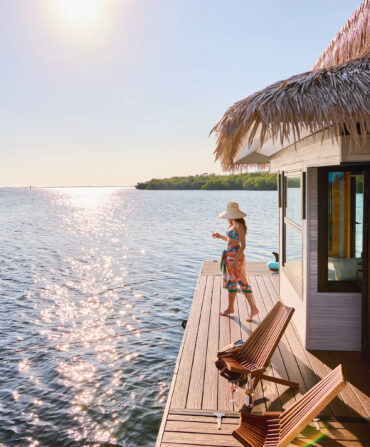Travel
Southern Road Trip: Bass Fishing in Florida
Casting for big bass in the Sunshine State
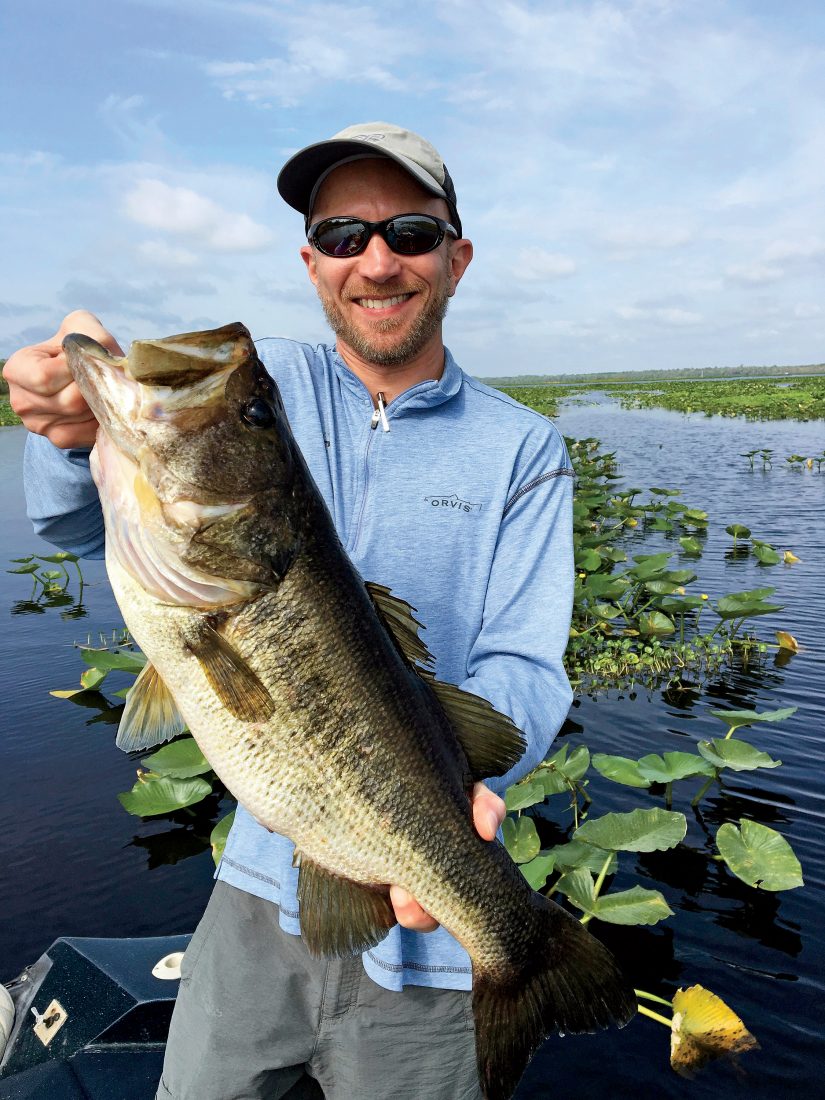
Photo: Ron Rawlings
The great songwriter Robert Earl Keen once penned a wishful ode called “The Five Pound Bass.” (“Big as a baby!”) No offense to Keen, but I had something a little heftier in mind when I called up Chris Wiley, a biologist with the Florida Fish and Wildlife Conservation Commission. Wiley analyzes the reports submitted to its TrophyCatch program, which offers rewards to anglers who land, document, and release a bass weighing eight pounds or better, and why, yes, he would be happy to send me a list of the lakes that produce the most lunkers. So there it was, a fisherman’s road trip in the making and an ambitious though not unattainable goal: catch an eight-pounder.
Flush with confidence from my call with the good biologist, my plan is to hit three of the top ten on the list in a long weekend. I head down I-95 and pull off onto a quiet two-lane toward my first stop, Highland Park Fish Camp, in DeLand, and the Saint Johns River. The Saint Johns flows some 310 miles north, beginning near Vero Beach. “So we’re in about the middle section,” says my guide, Ron Rawlins, when I meet him at the camp’s marina. “And it’s the prettiest section.” Rawlins’s family has run Highland Park for fifty-four years, and as we motor out at sunrise into the river’s backwaters, I see what he means. Surrounding us is the 22,000-acre Lake Woodruff National Wildlife Refuge, a haven for bears, deer, hundreds of species of birds, and lots of gators. No houses in sight.
We’re fishing live shiners under corks, a staple of the big-bass game, and I soon haul in my first Florida largemouth, about a two-pounder. Shiner fishing is not particularly complex, but with three days and an eight-pounder to catch, I’m happy to share the boat with some bait. We catch a few more bass and see threadfin shad breaking the surface. A trio of gators have noticed, too, and at times nearly leap out of the water, snapping their jaws. Welcome to Florida.
When I set my rod on the deck for a moment, it nearly jumps out of the boat. I grab it and rear back. This is no dink. When we finally put it on the scale: seven pounds. Things are looking up. By early afternoon, though, they’ve slowed down. Our only action is a large, fleshy blob with a nose that surfaces not ten feet from the boat and stares at me before I realize I’m gazing at a manatee.
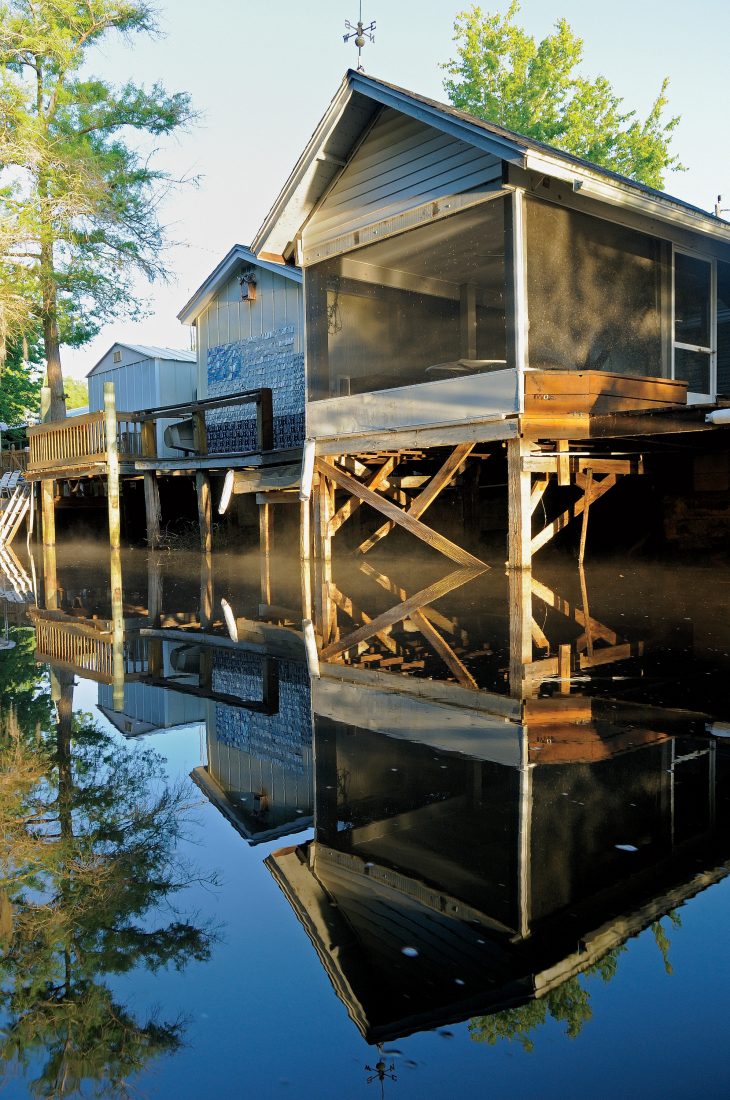
Photo: Tony Arruza
Waterfront cabins on Blue Cypress Lake near Middleton’s Fish Camp
I spend the rest of the afternoon meandering about DeLand’s funky shop-lined main street, ducking into the Half Wall Beer House for an early dinner and a pint before bunking down under a squeaky ceiling fan at one of Highland’s cabins. I have high hopes for tomorrow’s stop: Lake Toho.
I had scheduled a trip with guide Justen Moore for the afternoon, so with a few hours to kill, I head south toward Orlando and take a slight detour for a hike at the Bear Pond Trailhead in Seminole State Forest. Here you can channel your inner Bartram and link up with the Florida Trail, which winds some 1,300 miles across the scrub. I stop for lunch at an Orlando institution: Beefy King, a sixties-era fast-food relic in the best sense. After a gloriously beefy roast beef, “beefy spuds” (tots), coleslaw, and a root beer, it’s on to Kissimmee and the Big Toho Marina.
Moore has been guiding in the Kissimmee area for fourteen years and caught an eight-pounder here just two days ago. Perhaps it’s the Beefy King stupor, but I start out doing everything wrong. After some pointers from Moore, I manage to start landing a few fish, including one that I think might be pushing three but Moore assures me is not.
We try a number of spots and eventually circle back to our original hole, where immediately the cork goes down hard. I set the hook and feel the eminently satisfying pull of what seems more like a bowling ball than a baby—then heartbreak as the bait pulls loose. Moore checks the shiner and can see that the hook has buried itself in the bait rather than the bass. “There was nothing you could have done on that,” he tells me. “It’s just how you’re living.” It’s starting to get dark, and before returning to the marina, Moore says the thing that is already gnawing at me: “You could have had a ten-pound bass on and never known it.”
Still, I have one more try. I find my way to Florida’s Turnpike and drive south until I reach the exit for Yeehaw Junction, which lies precisely in the middle of nowhere. Passing signs for gator jerky, I turn onto what might be the darkest road I’ve ever been on to reach Middleton’s Fish Camp, on Blue Cypress Lake. It’s by all accounts a lovely lake, but I see none of it because before dawn I’m off to the nearby Kenansville reservoir.
Getting there requires a jaw-rattling ride along a twelve-mile dirt road, and I’m a little late when I pull up to the launch a bit past sunrise to meet my guide, Hugh Crumpler. “Good afternoon!” Crumpler says.
Crumpler has not brought any shiners. “We won’t need ’em,” he tells me. He once caught more than ninety bass here in one day. But apparently my luck has followed me because today it’s as slow as a Disney World line. We land only a few small fish, and to top it off, by noon thunder begins to rumble. “Well, I hate to say it,” Crumpler says as the first drops start to fall, “but I might should have brought some shiners.” Indeed. But as I bump my way back down the dirt road, rain now pelting the windshield, it’s Moore’s words I can’t seem to shake: You could have had a ten-pound bass on and never known it. The whole way home they haunt me. I’m guessing Mr. Keen would understand.


